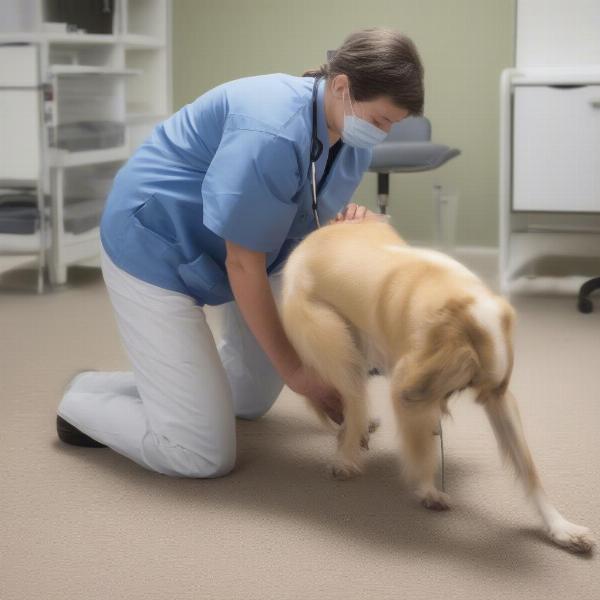Dealing with dog urine on your carpet can be frustrating. This comprehensive guide provides practical solutions to address the root cause of the problem and prevent future accidents. We’ll explore effective training techniques, health considerations, and cleaning strategies to help you achieve a clean, fresh-smelling home.
Understanding Why Your Dog Pees on the Carpet
Before addressing the issue, understanding the underlying reasons is crucial. Several factors can contribute to this behavior, including medical conditions, anxiety, territorial marking, or incomplete house training. Is it a new behavior or has it been happening for a while? Observing your dog’s behavior and consulting a veterinarian is the first step towards a solution.
Medical Reasons for Carpet Soiling
 Dog urinating on a carpet during vet check
Dog urinating on a carpet during vet check
Sometimes, a medical condition, such as a urinary tract infection (UTI) or incontinence, can cause your dog to urinate inappropriately. If your dog suddenly starts peeing on the carpet, especially if accompanied by other symptoms like frequent urination or straining, a vet visit is essential. Early diagnosis and treatment can resolve the issue and prevent further carpet damage.
Addressing Behavioral Causes
If medical issues are ruled out, the cause is likely behavioral. Incomplete house training is common, especially in puppies. Consistent training with positive reinforcement, using a designated potty area, and establishing a regular schedule can significantly improve house training success.
Establishing a Potty Routine
Take your dog out frequently, especially after waking up, eating, and playing. Reward successful potty breaks with praise and treats. Consistency is key to establishing a routine and reinforcing desired behavior.
Cleaning Up Accidents Effectively
Cleaning up accidents effectively is crucial to eliminate the odor and discourage repeat offenses. Use an enzymatic cleaner specifically designed for pet urine, as these break down the uric acid that causes the lingering smell. Avoid using ammonia-based cleaners, as the smell can resemble urine and confuse your dog. Blot the area thoroughly, and avoid rubbing, which can spread the stain.
Training and Positive Reinforcement
Positive reinforcement is a highly effective method for house training. Reward your dog for eliminating in the designated area with praise, treats, or a favorite toy. Avoid punishment, as this can create anxiety and worsen the problem.
Preventing Future Accidents
Once you’ve addressed the underlying cause and cleaned up any existing stains, focus on preventing future accidents. This might involve using belly bands or diapers for incontinent dogs, managing anxiety through medication or behavioral therapy, or continuing consistent house training.
Conclusion
Stopping a dog from peeing on the carpet requires a multi-faceted approach, addressing both medical and behavioral factors. By understanding the underlying cause, implementing effective training techniques, and maintaining a clean environment, you can successfully resolve this common issue and enjoy a harmonious home with your furry friend. Remember, patience and consistency are key.
FAQ
- How can I tell if my dog’s carpet peeing is medical or behavioral? Sudden changes in behavior, straining, or frequent urination suggest a medical issue. Consult your vet.
- What’s the best way to clean dog urine from a carpet? Use an enzymatic cleaner specifically designed for pet urine to eliminate the odor completely.
- How often should I take my puppy out to potty? Every 2-3 hours, especially after waking up, eating, and playing.
- Is it okay to punish my dog for peeing on the carpet? No, punishment can create anxiety and worsen the problem. Focus on positive reinforcement.
- What if my dog continues to pee on the carpet despite training? Consult a certified dog trainer or behaviorist for personalized guidance.
- Are there any products that can help prevent accidents? Belly bands or diapers can be helpful for incontinent dogs.
- How can I create a positive potty training experience for my dog? Use consistent praise, rewards, and a designated potty area.
ILM Dog offers expert advice and resources on all aspects of dog care, from breed selection and health to training and nutrition. We provide reliable, practical information to help you provide the best possible care for your canine companion. Whether you’re a new dog owner or a seasoned expert, ILM Dog is here to support you every step of the way. Contact us today for personalized guidance. Email: [email protected], Phone: +44 20-3965-8624. Visit ILM Dog for more valuable insights and tips.